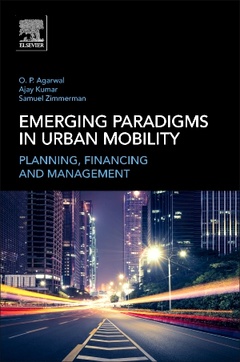Description
Emerging Paradigms in Urban Mobility
Planning, Financing and Management
Authors: Agarwal Om Prakash, Zimmerman Samuel, Kumar Ajay
Language: English
Subject for Emerging Paradigms in Urban Mobility:
Keywords
Aggregator platforms; Air quality; Air rights; Autonomous vehicles; Climate change; Collaborative approach; Communications; Community involvement; Concentrated cost; Connected vehicles; Diffused benefits; Dock-less bike share; Driverless/self-driving cars; Electric batteries; Electric vehicle; Fare integration; Finance; First mile/last mile; Gasohol; Hackability; ITS; In-vehicle time; Intelligent transport system (ITS); Internal combustion (IC); Joint development; Land value capture; Last mile connectivity; Low-speed electric vehicles; Mobility on demand; Mode choice; Multimodal integration; Multimodalism; Navigation systems; Networking; Optimizing transport assets; Paradigm change; Planning; Pollution; Public consultation; Public transport; Public-private partnership; Renewable electricity; Service contracts; Smart city; Smart transportation systems; Social media; Stakeholder; Top-down planning; Transport tax; Urban transport systems; Vehicle tracking; Zero emissions-vehicle; whole trip concept
122.46 €
In Print (Delivery period: 14 days).
Add to cart266 p. · 15x22.8 cm · Paperback
Description
/li>Contents
/li>Readership
/li>Biography
/li>Comment
/li>
Emerging Paradigms in Urban Mobility: Planning, Finance and Implementation explains the types of new urban mobility planning paradigms that are emerging throughout the world, along with their potential to transform the transportation landscape. As half of the world?s 7 billion people now live in cities, thus causing severe road congestion, increased air pollution, energy insecurity and sustainability problems in cities and the planet itself, this book presents new paradigms that are emerging to address these problems, along with other topics of note, including economic efficiency, health, the well-being of cities and their residents, urban mobility transformations, and the role of social media.
In addition, the book looks at Integrated Corridor Management and how it improves the people-moving performance of multi-modal transport systems in high demand urban corridors and how countries balance the mobility benefits of motorcycles with the environmental and safety threats they pose.
1. Introduction2. Governance3. Planning Principles4. The Changing Role of Public Transport5. Transformational Potential of Information Technology6. Changing Approaches to Transport Finance 7. Managing Roadways for Moving People and Goods8. Opportunities and Challenges of Motorized Two-Wheelers9. Beyond Congestion10. Social Media as an Instrument of Change11. Transport impact of the Changing Role of Women12. Lessons for the Future
1) Urban Transportation Planning and Urban Planning researchers, academics, and graduate students, 2) Urban Transportation policy makers, planners, and other practitioners in cities around the globe.
Ajay Kumar is the former Lead Transport Economist for the World Bank. He has more than 30 years of experience in transport and urban sector public policy, strategic planning, and finance. During his time at the World Bank, he worked in more than 40 countries across Central Asia, South and East Asia, and Africa. He holds a PhD in Urban Economics and Planning from UCLA.
Dr. Ajay is an Associate Professor in the Mechanical Engineering Department at JECRC University, India. He received his Ph.D. in the field of advanced manufacturing from Guru Jambheshwar University of Science & Technology, India, after B.Tech. (Hons.) in mechanical engineering and M.Tech. (Distinction) in manufacturing and automation. His research spans incremental sheet forming, artificial intelligence, sustainable materials, additive manufacturing, mechatronics, smart manufacturing, industry 4.0, waste management, and optimization techniques. He has organized international conferences and holds more than 20 patents. With 15 years of teaching and research experience, Dr. Ajay is a Guest Editor for Frontiers in Sustainability and actively contributes to conferences and symposiums. Recognized with merit and best teacher awards, he advises the QCFI, Delhi Chapter student cell at JECRC University, and has played a key role in various academic and professional initiatives.
- Provides previously unpublished research on new approaches to integrating governance, the changing role of IT, and shared mobility initiatives
- Links transportation and land use, climate change, and poverty reduction and gender, going well beyond the technical issues of transport planning
- Highlights successful factors that have worked and how they can be tailored to different contexts
- Includes learning aids, such as case studies, text boxes and chapter openers and summaries
These books may interest you

Urban Mobility Design 122.46 €



